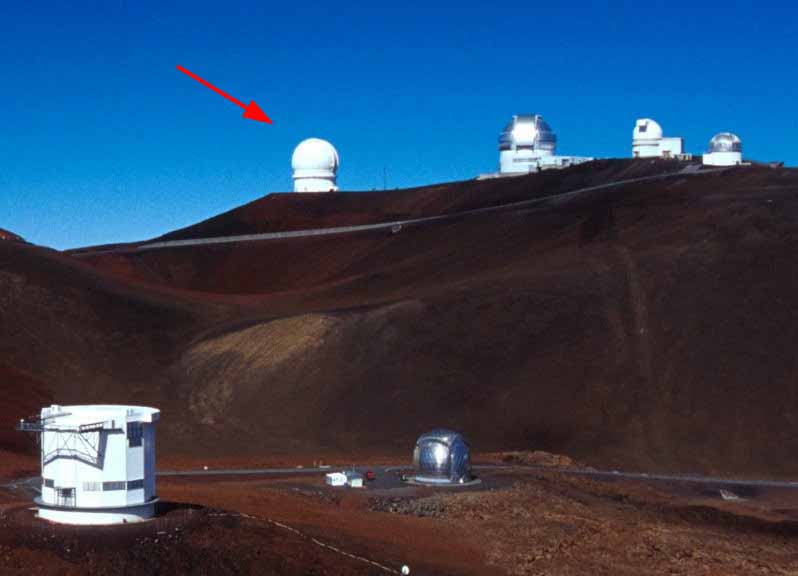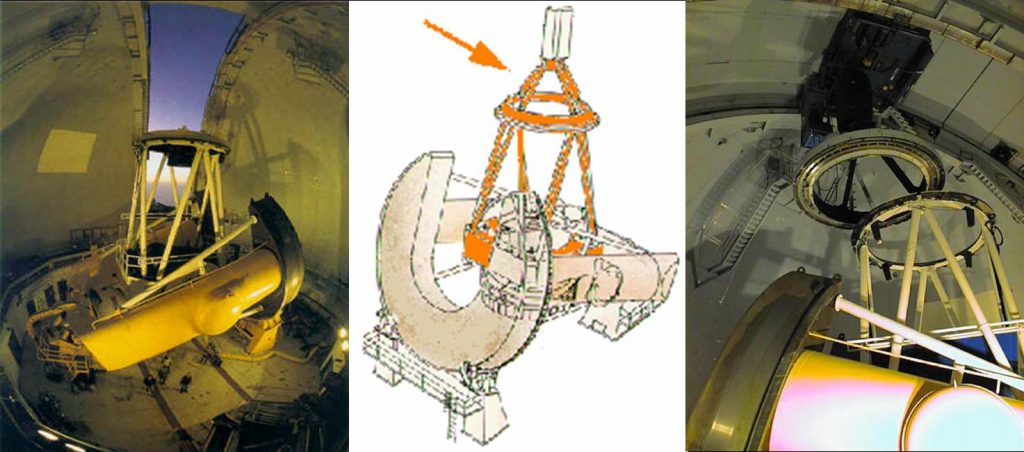 |
Megacam |
 |
|---|
MegaCam A major instrument at the CFHT observatory (Canada-France-Hawaii Telescope)
The MegaCam camera was developed for the prime focus of the 3.6m diameter Canada-France-Hawaii Telescope (CFHT), on the summit of the Mauna Kea volcano, at an altitude of 4200m on the Big Island of Hawaii (USA).


When built in 1979, the CFHT telescope was one of the largest in the world. The recent commissioning of a new generation of very large telescopes with mirrors diameters up to 8 or 10m, as at the ESO european observatory in Chile (Very Large Telescopes -VLT) or at the Keck observatory (also in Hawaii), led the scientific community to look for a reconversion of the now intermediate size instruments. It was then decided to equip CFHT with a new wide field imaging facility which would use a sizeable fraction of the telescope observing time. Canada and France thus decided to gather a large amount of their observing time, more than 450 nights of observation spread over 5 years, for the completion of several extensive surveys which form a large science program called the “Canada-France-Hawaii Telescope Legacy Survey”.
An international collaboration
The MegaCam camera, developed at CEA, is at the heart of the MegaPrime instrument which equips the new prime focus of the CFHT telescope. This instrument is composed of the different elements necessary for the adaptation of the MegaCam camera at the top of the telescope. Indeed, the camera is installed at the so called “prime” focus of the telescope, which is at the very end of the telescope tube, a location where the optical configuration gives the largest field of view on the sky. This focus is located at a height greater than 15 meters, above the mirror. When the telescope was commissioned, this focus was equipped with a “prime cage”, a very narrow space where an astronomer could fit and spend the night manually adjusting the instruments. This poetry of astronomical observations is now gone. In its modern design, this focus is fully remotely controlled from a control room located beneath the telescope floor.

The MegaPrime is the result of the collaboration between several institutes:
– the CEA-DAPNIA built the whole MegaCam camera including its associated systems (readout electronics, cryogenic system, the control-command system for the camera, as well as the shutter and the filter exchange system.
– the Division technique of INSU/CNRS contributed to the study of the new telescope focus (with the collaboration of the CFHT observatory).
– the CFHT Observatory designed the support of the camera, as well as the environment and electricazl and thermal links and integrated the whole new focus.
– the Observatoire de Paris-Meudon (OPM) built the so called “tip-tilt” system which stabilizes the image.
– the Herzberg Institute of Astrophysics (HIA) in Canada built the focusing and guiding systems and designed the field corrector which lenses were fabricated by the french company REOSC.
Last, for a quick analysis and use of the camera images, a dedicated MegaCam data analysis center named “Terapix” was created under the responsibility of the Institut d'Astrophysique de Paris.

